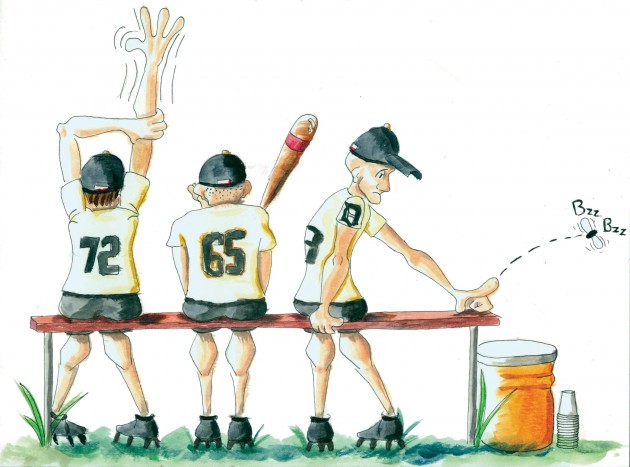
"The first minutes I got came just out of nowhere. I mean, I didn't play at all."
Senior Ian Rumpp was sitting outside of Roy. O West Library, talking about one of his first in-game moments his junior year on the DePauw men's basketball team. His eyes widened and he perked up noticeably.
"We're down against Birmingham Southern," Rump continued. "And we can't get any offense going and you can tell coach [Bill Fenlon] is just getting irritated. And then coach just looks at the bench, looks at me and says, 'Rumpp, get him.'"
This memory is clearly something Rumpp enjoys talking about. He has just finished his senior season a few weeks ago after a first-round loss in the NCAC tournament to Wooster.
He explained that in the game he ended up hitting four out of five three pointers in what turned out to be a close loss, but to him it was a lesson and some well-earned reassurance.
"That feeling that I was ready to go when I got my chance," Rumpp said. "It just proved that everything I was doing was worth it. I tried to develop this (mindset) because otherwise it was like 'why am I even playing?"
Rumpp, like many athletes at DePauw, was not the number one player for his team. In fact, for more than two seasons, he was a bench player. Game nights he would go to the gym, put on his uniform in the locker room, do a couple lay-ups before the game and then watch his teammates compete for the night.
That is the reality for many of athletes at DePauw. No one grows wishing to one day back-up the starting center or watch their teammate hit the winning home run. Anyone that aspires to be a great athlete wants those moments, but, for a number of athletes, the closest they will get is a sideline next to the court or field.
Sophomore Mary Arnold is a member of the women's tennis team. She has played since her freshman year and is not currently in the starting lineup. For her, tennis is another outlet.
"Tennis has created a family away from home. I'm with them 24/7," Arnold said. "It's really helped me academically and to get involved in other organizations. It's a pretty big commitment, but our coach stresses academics and getting involved with the community. It's been the foundation for everything that I do. "
Arnold, though, is only a sophomore. Expecting two more seasons of opportunities to compete for spots can be an easy way to rationalize not playing.
"Being younger definitely helps," Arnold said, "just being able to absorb the experiences from the other girls and still know I'm at a position where I can learn so much in the amount of time I'm allotted."
Sophomore J.B. McCallum, a member of the baseball team, is another DePauw athlete who understands the hardships of the depth chart. Right now, he understands his role as a "late-inning defensive replacement," but that does not mean he has no further aspirations.
"We graduate a lot of seniors this year," McCallum said. "There will be plenty of positions open next year."
What tends to be forgotten is that people like McCallum, Arnold and Rumpp are all good athletes. These are people who excelled at their sports in high school. Someone who has a chance to compete athletically at a collegiate level - even at Div. III - has had prior success in his or her sport.
Junior Steven Pjevach, a member of the men's tennis team, was a part of four Minnesota state championships prior to coming to DePauw. To go from that kind of success to watching from the sidelines proved a tough transition.
"That definitely made it difficult," Pjevach said. "It can be frustrating. You come knowing your talent level and then you see other kids play and you're just like 'wow.'"
Pjevach has been a part of the starting rotation before, but is currently out of the lineup. He always strives to earn a solid spot, but has learned to appreciate other facets of his tennis experience.
"I feel like it's helped my DePauw experience more than it has hurt it," Pjevach said. "Sure it kind of sucks to put in three hours a day of for practice, but I would rather have the relationships I do right now as well as stay in shape than not play on the team. Having my best friends at practice every day definitely helps keep me coming back."
Relationships often form when talking to these players. They refer to their teammates as "friends" or "family." It can seem a little cliché, but it also seems genuine when they describe it. And why would they lie? They are not getting paid or receiving any athletic scholarship. These are students who participate in sports as an extracurricular activity. The respect and admiration of their coaches and teammates may be all that they ask for, which seems to be what they receive.
"Rumpp to the rescue," senior starting guard Sean Haseley said of his teammate's play last year. "He stuck with it man. He's the classic example. When he came in, that just got us hyped."
